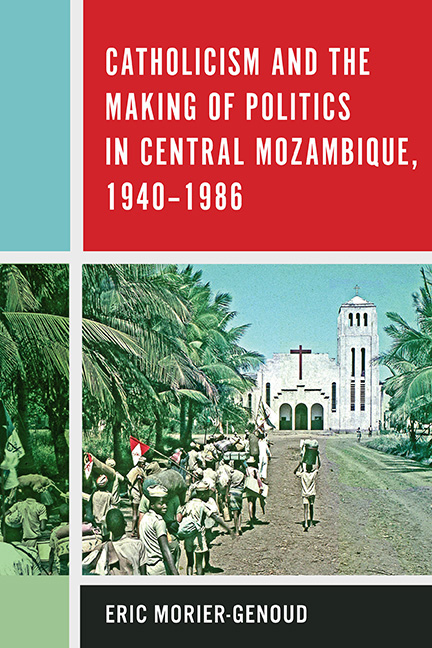Book contents
- Frontmatter
- Dedication
- Contents
- List of Illustrations
- Acknowledgments
- Note on Translations
- List of Abbreviations
- Introduction
- 1 The Making of the Diocese of Beira
- 2 Diversity and Dynamics of the Imperial Church
- 3 The Formation of an African Church
- 4 Gathering Storm: Vatican II Meets African Nationalism
- 5 Decolonization? War, Implosion, and the Vatican
- 6 Independence: Revolution and Counterrevolution
- Epilogue
- Notes
- Bibliography
- Index
6 - Independence: Revolution and Counterrevolution
Published online by Cambridge University Press: 28 June 2019
- Frontmatter
- Dedication
- Contents
- List of Illustrations
- Acknowledgments
- Note on Translations
- List of Abbreviations
- Introduction
- 1 The Making of the Diocese of Beira
- 2 Diversity and Dynamics of the Imperial Church
- 3 The Formation of an African Church
- 4 Gathering Storm: Vatican II Meets African Nationalism
- 5 Decolonization? War, Implosion, and the Vatican
- 6 Independence: Revolution and Counterrevolution
- Epilogue
- Notes
- Bibliography
- Index
Summary
The decolonization process in Mozambique began with a coup d’état in Lisbon on April 25, 1974. Military captains involved in the “colonial wars,” tired of a conflict that they felt could not be won militarily, seized power in Lisbon and put an end to the Estado Novo. Decolonization did not follow immediately. The first transitional government was ambiguous about the empire, some factions, including the new president, showing an interest in an “imperial federation of states.” After a few months and several transitional governments, the new regime eventually committed to a negotiated handover of power. Because Frelimo was the main nationalist movement in Mozambique and had not stopped fighting after the coup d’état, the Portuguese government agreed to enter negotiations on independence with it exclusively. Talks took place in Zambia, leading to an agreement in September 1974. Independence was to be formally granted in June 1975; until then, there was to be a period of transition during which Frelimo and the Portuguese army would together administer the territory. On June 25, 1975, power was duly transferred to Frelimo, and national independence ensued. A period of massive change followed as Portuguese settlers left the country en masse and Frelimo engaged the country on the path of a socialist revolution.
After 1975, all key institutions in Mozambique underwent massive change—the state, the churches, and society more broadly. This happened in a tense regional context, with two white settler regimes, Rhodesia and southern Africa, at its borders, allied to each other and opposed to African independence and socialism. This chapter investigates these radical changes in Mozambique in order to understand how the Catholic Church changed with independence, how it related to the new Frelimo government and its socialist project, and how it reacted to the eruption of a new war, launched by Rhodesia and the Resistência Nacional Moçambicana (Mozambican National Resistance, RENAMO) guerrilla movement. While the period is different, historical works often continue to operate under a “political paradigm” (see the introduction). Trying to break from it, the coming pages aim not to figure out whether the church supported the Revolution or the Counter-Revolution, but to understand how, within the limits of “possibility and constraint,” the church carried on working, reorganized itself, and gave itself a new mission.
- Type
- Chapter
- Information
- Publisher: Boydell & BrewerPrint publication year: 2019



